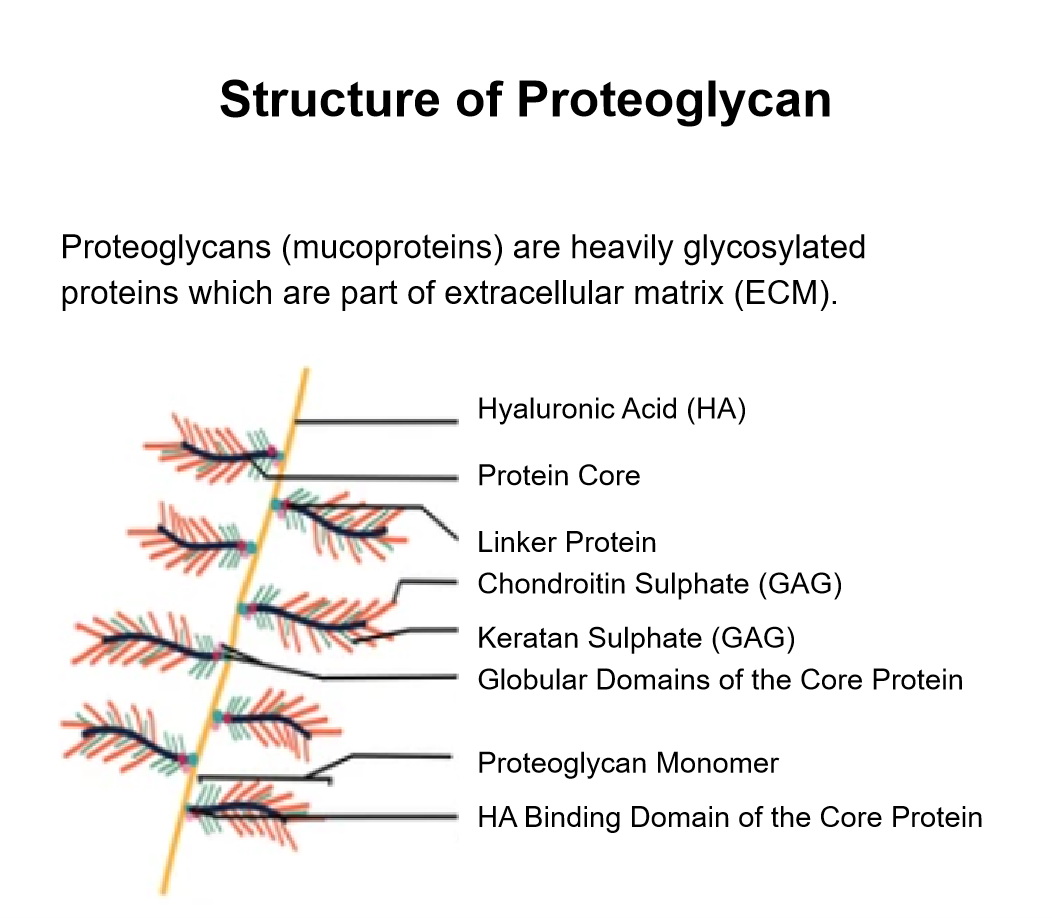Proteoglycans
Related Symbol Search List
- SDC1
- VCAN
- AGRN
- FMOD
- OPTC
- PRELP
- ACAN
- NCAN
- SPOCK1
- SPOCK2
- SPOCK3
- AMBP
- BGN
- CHAD
- CSPG5
- EPYC
- ESM1
- Gpc2
- GPC3
- GPC6
- LUM
- OGN
- Omd
- PODN
- PODXL2
- RNF5
- Syndecan-2
- SDC3
- SDC4
- SGCA
- SGCD
- TGFBR3
Immunology Background
About Proteoglycans
Proteoglycans are a class of complex molecules found in the extracellular matrix (ECM) and on cell surfaces. They are composed of a core protein and one or more covalently attached glycosaminoglycan (GAG) chains. Proteoglycans are widely distributed throughout the body and play essential roles in various physiological and pathological processes.
The basic structure of proteoglycans consists of a protein core that is heavily modified by GAG chains. The protein core provides structural stability and determines the specific functions of the proteoglycan, while the GAG chains confer unique properties to the molecule. The GAG chains are long, linear polysaccharides composed of repeating disaccharide units, such as chondroitin sulfate, dermatan sulfate, heparan sulfate, heparin, keratan sulfate, and hyaluronic acid. The GAG chains are negatively charged due to the presence of sulfate or carboxyl groups, allowing proteoglycans to interact with water and form hydrated gels.

Proteoglycans have numerous important roles in the body. They help maintain the integrity and resilience of connective tissues, such as cartilage, tendons, and ligaments. They also play a crucial role in regulating the bioavailability and activity of growth factors and cytokines, which are essential for various cellular processes like cell communication, proliferation, and differentiation. Additionally, proteoglycans are involved in cell adhesion, migration, and signaling, contributing to processes such as wound healing, tissue repair, and embryonic development. They also have a role in maintaining the hydration and lubrication of joints, as well as in the regulation of blood clotting and inflammation.
Defects or abnormalities in proteoglycans can lead to various diseases and disorders. For example, in osteoarthritis, alterations in the composition and structure of proteoglycans in joint cartilage can result in reduced cartilage resilience and increased degradation. In certain genetic disorders, such as Hunter syndrome, there may be a deficiency in the enzymes responsible for synthesizing specific GAGs, leading to the accumulation of these molecules and causing a range of symptoms.
The diverse functions of proteoglycans highlight their importance in numerous physiological processes and their involvement in various pathological conditions. By understanding the structure and functions of proteoglycans, researchers can gain insights into the mechanisms underlying tissue development, homeostasis, and disease progression, potentially leading to the development of novel therapeutic strategies.
Physiological Functions of Proteoglycans
Structural Support: Proteoglycans provide structural support to tissues by interacting with other ECM components, such as collagen and elastin fibers. They help maintain tissue integrity and contribute to the mechanical properties of tissues, such as elasticity and resilience.
Cell-Matrix Interactions: Proteoglycans play crucial roles in cell-matrix interactions. They can act as cell surface receptors or co-receptors, facilitating cell adhesion, migration, and signaling. Proteoglycans regulate the interactions between cells and the ECM, influencing processes like cell proliferation, differentiation, and tissue morphogenesis.
Water and Ion Balance: Due to their high negative charge and ability to bind water, proteoglycans contribute to the hydration and swelling properties of tissues. They help maintain tissue hydration, regulate water balance, and provide compressive resistance, which is particularly important in cartilage and other load-bearing tissues.
Signal Regulation: Proteoglycans interact with growth factors, cytokines, and other signaling molecules, modulating their availability, stability, and activity. They can sequester these molecules within the ECM, control their release, and facilitate their binding to cell surface receptors, thereby regulating various cellular processes and signaling pathways.
Tissue Development and Remodeling: Proteoglycans are involved in tissue development, morphogenesis, and remodeling. They participate in processes like cell migration, tissue patterning, and differentiation during embryonic development. Proteoglycans also contribute to tissue repair and regeneration by guiding cell behavior and modulating ECM remodeling.
Immune Responses and Inflammation: Certain proteoglycans interact with immune cells and modulate immune responses. They can participate in cell adhesion and migration processes, regulate the activity of immune signaling molecules, and influence the recruitment and activation of immune cells during inflammation and immune reactions.
Disease Associations: Dysfunction or alterations in proteoglycans are associated with various diseases and conditions. For example, abnormalities in proteoglycan metabolism are linked to connective tissue disorders, osteoarthritis, cardiovascular diseases, cancer metastasis, and neurodegenerative diseases.
Available Resources for Proteoglycans
Creative BioMart provides an extensive array of specialized products and services to facilitate investigations into proteoglycans. Our offerings encompass recombinant proteins, cell and tissue lysates, pre-coupled protein beads, antibodies, and more, all meticulously designed to unravel the fundamental mechanisms governing their functions.
In addition, we furnish comprehensive resource support, integrating associated pathways, protein functions, interacting proteins, related research domains, pertinent articles, and supplementary materials about proteoglycans. This holistic support is tailored to elevate the comprehension and exploration of the functions and regulatory mechanisms underpinning these crucial molecules.
Discover a wealth of resources dedicated to proteoglycans below.
Should you require further assistance or personalized services, please feel free to reach out. Our commitment lies in delivering top-tier research tools and services to bolster your pursuit of successful scientific outcomes.

